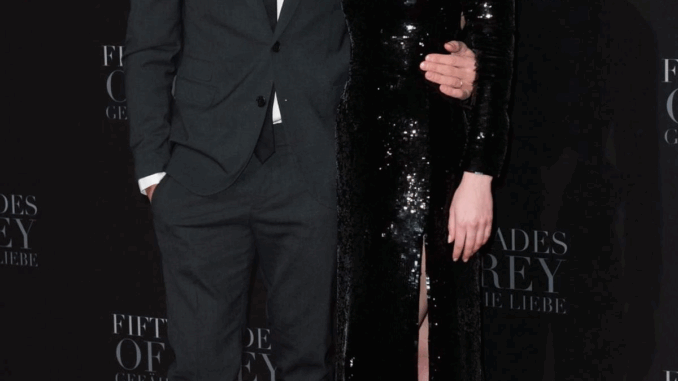
When Dakota Johnson finally spoke, the world listened. For years, her silence was as loud as the screams of millions of fans who demanded to know what really happened between her and Jamie Dornan during the filming of the Fifty Shades trilogy. Rumors swirled like wildfire—secret love, behind-the-scenes fights, hidden intimacy that went far beyond the script. Jamie married, Dakota single, both trapped in a cinematic universe that blurred the line between performance and reality. Yet Dakota never confirmed, never denied. She laughed in interviews, dodged questions, teased audiences with her sly smile. Until one day, she decided to break her silence. And what she confessed was far more shocking than anyone expected.
Dakota began by admitting the obvious: playing Anastasia Steele was never just a job. It consumed her. Every scene required surrender, every moment on set demanded emotional exposure so raw it bled into her real life. She revealed that she often left filming physically drained, mentally fractured, and emotionally unstable. But then she said the words that would change everything: “I couldn’t have done it without Jamie. And sometimes I wonder if that connection went too far.”
Too far. Those two words detonated like a bomb. What did she mean? Did she mean passion? Did she mean desire? Did she mean that the chemistry audiences obsessed over was more than fiction? Her confession didn’t clarify—it deepened the mystery. Suddenly, every old interview clip resurfaced online, dissected frame by frame. The way Jamie touched her back gently during press tours. The way she defended him against critics, even when no one asked her to. The way they laughed at private jokes in crowded rooms, oblivious to the cameras. Fans argued that her statement was confirmation, proof that their bond crossed into dangerous territory.
But Dakota didn’t stop there. She confessed that the toll on her personal life was staggering. Lovers walked away because they could not compete with the shadow of Jamie Dornan. She was accused of being obsessed, of holding on to something imaginary, when in truth she was haunted by memories she couldn’t erase. “There were nights when I woke up and felt like Anastasia was still inside me,” she said. “And if Ana was still there, so was Christian. And that meant Jamie too.”
Her words reopened wounds that Jamie had spent years trying to close. Married, protective of his family, Jamie had long insisted his relationship with Dakota was professional, supportive, but nothing more. Yet Dakota’s confession made that stance sound brittle, fragile, as though it were a shield built on half-truths. Because if Dakota herself admitted the bond was dangerously real, then how could Jamie’s denials hold weight? The press exploded. Headlines screamed betrayal, scandal, forbidden love. Jamie’s marriage was dragged into the spotlight once again, his wife scrutinized for any hint of anger or heartbreak. Was she blindsided? Had she always known? Or was Dakota’s confession a cruel twist of fate, reopening scars that time had only just begun to heal?
Behind closed doors, those who worked on the Fifty Shades set were not surprised. Crew members had whispered for years about the electricity between Jamie and Dakota. Some described moments when the director yelled “cut” but neither actor moved, their eyes locked, bodies pressed together as though forgetting the cameras. Others recalled late-night rehearsals that seemed unnecessary, yet always ended with the same lingering intimacy. To them, Dakota’s confession wasn’t a revelation—it was a confirmation of what they’d always suspected.
But perhaps the most shocking part of Dakota’s words was her acknowledgment of guilt. She admitted she sometimes wondered if her closeness with Jamie had been unfair to his wife, that the rumors may have damaged lives in ways she never intended. Yet she also admitted she couldn’t regret it. “What we had—it was real in its own way. Maybe it wasn’t love, maybe it wasn’t an affair, but it was something bigger than both of us. And I’ll carry it forever.”

Fans, divided as ever, exploded into chaos. Some defended Dakota, praising her bravery for finally speaking her truth. Others condemned her, accusing her of selfishly exposing Jamie’s private life, of stirring a scandal that should have remained buried. Jamie himself stayed silent, his refusal to respond only fueling the fire. Silence became louder than any statement, his absence in the conversation interpreted as guilt, fear, or heartbreak, depending on who you asked.
What Dakota’s confession truly revealed, however, was the impossible burden of living inside a fantasy the world refused to end. She and Jamie didn’t just act out a story—they embodied it. The trilogy chained them together in ways neither anticipated, ways that destroyed personal relationships, reshaped their careers, and redefined how audiences saw them forever. And when the cameras stopped, when the contracts ended, the bond didn’t vanish. It lingered, ghostlike, haunting them through headlines, whispers, and now, Dakota’s own words.
The danger of her confession is not that it reveals an affair—it never explicitly does—but that it confirms what fans always believed: something happened between Jamie Dornan and Dakota Johnson, something too intimate to label, too complex to deny, too dangerous to explain. The truth may never be spelled out, but Dakota’s silence is broken, and with it, the fragile wall Jamie built around his personal life has begun to crack.
Because in the end, Dakota Johnson’s confession wasn’t about Anastasia Steele or Christian Grey. It was about herself, about Jamie, about two people trapped in a fantasy that became reality, then legend, then scandal. And once the silence broke, there was no going back.
